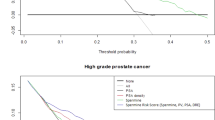Abstract
The incidence of renal cell carcinoma (RCC) has been steadily rising each year. There are currently few recognized biomarkers for the diagnosis and prognosis of RCC. We investigated semenogelin I (Sg I) expression and its clinical significance in patients with RCC. The expression levels of Sg I and its protein were measured by qPCR and Western blotting, respectively. Immunohistochemistry was used to investigate the protein expression of Sg I in RCC and normal renal tissue from 53 patients. The Kaplan–Meier method and log-rank test were used to evaluate the data. By qRCR (p < 0.01) and Western blot, the level of Sg I expression in benign tissues was higher than that in RCC tissues. Expression of Sg I was observed in 30 (57 %) RCC cases, which was significantly lower than that observed in benign renal tissues from the same patients [Sg I positive in 53 (100 %) cases (p < 0.0001)] by immunohistochemistry. There was an inverse relation between Sg I expression and clinical stage (pT1-2 vs pT3-4, p < 0.0001). Patients with Sg I-negative tumor had a significantly higher risk of recurrence (Kaplan–Meier and log-rank tests, p < 0.0001). There was low Sg I expression in RCC. Sg I expression has potential value in predicting cancer progression and prognosis. These findings support the use of Sg I as a novel biomarker for RCC.




Similar content being viewed by others
References
Li Z, Zhang Y, Kim WJ, et al. PGE2 promotes renal carcinoma cell invasion through activated RalA. Oncogene. 2013;32:1408.
Sun M, Lughezzani G, Perrotte P, et al. Treatment of metastatic renal cell carcinoma. Nat Rev Urol. 2010;7:327.
Negrier S. Duration of targeted therapy for metastatic renal cell carcinoma: a review of current practices. Oncology. 2012;82:189.
Cairns P. Renal cell carcinoma. Cancer Biomark. 2010;9:461.
Canacci AM, Izumi K, Zheng Y, et al. Expression of semenogelins I and II and its prognostic significance in human prostate cancer. Prostate. 2011;71:1108.
Wang Z, Widgren EE, Sivashanmugam P, et al. Association of eppin with semenogelin on human spermatozoa. Biol Reprod. 2005;72:1064.
Jonsson M, Linse S, Frohm B, et al. Semenogelins I and II bind zinc and regulate the activity of prostate-specific antigen. Biochem J. 2005;387:447.
Mitra A, Richardson RT, O’Rand MG. Analysis of recombinant human semenogelin as an inhibitor of human sperm motility. Biol Reprod. 2010;82:489.
Jonsson M, Lundwall A, Malm J. The semenogelins: proteins with functions beyond reproduction? Cell Mol Life Sci. 2006;63:2886.
Lundwal A, Bjartell A, Olsson AY, Malm J. Semenogelin I and II, the predominant human seminal plasma proteins, are also expressed in non-genital tissues. Mol Hum Reprod. 2002;8:805.
Bonilha VL, Rayborn ME, Shadrach K, et al. Characterization of semenogelin proteins in the human retina. Exp Eye Res. 2006;83:120.
Rodrigues RG. Semenogelins are ectopically expressed in small cell lung carcinoma. Clin Cancer Res. 2001;7:854.
Zhang Y, Wang Z, Liu H, et al. Pattern of gene expression and immune responses to semenogelin 1 in chronic hematologic malignancies. J Immunother. 2003;26:461.
Wang Z-J, Zhang W, Feng N-H, et al. Molecular mechanism of epididymal protease inhibitor modulating the liquefaction of human semen. Asian J Androl. 2008;10:770.
Izumi K, Li Y, Zheng Y, et al. Seminal plasma proteins in prostatic carcinoma: increased nuclear semenogelin I expression is a predictor of biochemical recurrence after radical prostatectomy. Hum Pathol. 2012;43:1991.
Roan, N. R., Liu, H., Usmani, S. M. et al.: Liquefaction of semen generates and later degrades a conserved semenogelin peptide that enhances HIV infection. J Virol. 2014;88(13):7221–7234.
Malm J, Hellman J, Magnusson H, et al. Isolation and characterization of the major gel proteins in human semen, semenogelin I and semenogelin II. Eur J Biochem. 1996;238:48.
Silva EJ, Hamil KG, O’Rand MG. Interacting proteins on human spermatozoa: adaptive evolution of the binding of semenogelin I to EPPIN. PLoS One. 2013;8:e82014.
Chawla SN, Crispen PL, Hanlon AL, et al. The natural history of observed enhancing renal masses: meta-analysis and review of the world literature. J Urol. 2006;175:425.
Ambring A, Bjorholt I, Lesen E, et al. Treatment with sorafenib and sunitinib in renal cell cancer: a Swedish register-based study. Med Oncol. 2013;30:331.
Coral S, Sigalotti L, Altomonte M, et al. 5-Aza-2′-deoxycytidine-induced expression of functional cancer testis antigens in human renal cell carcinoma: immunotherapeutic implications. Clin Cancer Res. 2002;8:2690.
Zhang Y, Wang Z, Zhang J, et al. Core promoter sequence of SEMG I spans between the two putative GATA-1 binding domains and is responsive to IL-4 and IL-6 in myeloma cells. Leuk Res. 2009;33:166.
Acknowledgments
This study was supported by the National Natural Science Foundation of China (No. 81270685).
Conflicts of interest
None
Author information
Authors and Affiliations
Corresponding author
Rights and permissions
About this article
Cite this article
Zhang, S., Fang, J., Zhang, X. et al. Seminal plasma protein in renal cell carcinoma: expression of semenogelin I is a predictor for cancer progression and prognosis. Tumor Biol. 35, 9095–9100 (2014). https://doi.org/10.1007/s13277-014-2184-6
Received:
Accepted:
Published:
Issue Date:
DOI: https://doi.org/10.1007/s13277-014-2184-6




